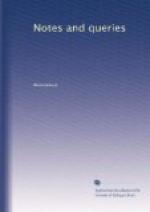R.G.
Complutensian Polyglot.—The following extract from “The Prospectus of a Critical Edition of the New Testament,” by the learned Mr. S. Prideaux Tregelles, affords a satisfactory reply to Mr. Jebb’s query, No. 14. p. 212.:—
“However there is now more certainty as to the MSS. belonging to the University of Alcala. Dr. James Thompson has published (Biblical Review, March, 1847), the result of inquiries made thirty years ago by Dr. Bowring, and more recently by himself. Hence it appears that all the MSS. which formerly were known as belonging to Cardinal Ximenes, and which were preserved in the library of Alcala, are now with the rest of that library, at Madrid....Dr. Jose Gutierrez, the present librarian at Madrid, communicated to Dr. J. Thomson a catalogue of the Complutensian MSS., and from this it appears that the principal MSS. used in the Polyglott are all safely preserved.”
J. MILNER BARRY.
Totnes, Feb. 6. 1850.
* * * * *{252}
Christmas Hymn.—Your correspondent “E.V.” (No. 13. p. 201.) asks for the author of the Christmas Hymn—
“Hark! the Herald Angels sing.”
I believe it to be the composition of the Rev. Charles Wesley, the younger brother of the celebrated John Wesley: he was born in 1708, and died in 1788. He was the author of many of the hymns in his brother’s collection, which are distinguished for their elegance and simplicity. I am not able to find out, for certain, whether he had another name; if he had, it was probably the occasion of the initials (J.C.W.) your correspondent mentions.
J.K.R.W.
Sir Jeffery Wyattville.—Sir Jeffery Wyattville, respecting whom “J.P.” inquires (No. 14. p. 215.), was knighted at Windsor Castle, Dec. 9, 1828., on the king entering into possession after the restoration.
S.G.
[To which may be added, on the information of our valued correspondent “C.,” “that it was about 1824 that Mr. Wyatt, being appointed by George IV. to conduct the improvements at Windsor Castle, had the absurd ambition of distinguishing himself from the other architects of his name by changing it to Wyattville. This produced the following epigram in, I think, the Morning Chronicle:—
“’Let GEORGE whose
restlessness leaves nothing quiet,
Change, if he
will, the good old name of Wyatt;
But let us hope
that their united skill
May not make Windsor
Castle—Wyattsville!’”]
"Peruse."—In reply to the question of “H.W.” (No. 14. p. 215.), although from want of minute reference I have been unable to find, in the original edition, the quotation from Frith’s works, I beg leave to suggest that the word “Peruse” is a misprint, and that the true reading is “Pervise.” To this day the first examination at Oxford, commonly called the “Little-Go,” is “Responsiones in Parviso.” It must not, however, be supposed that “Pervise,” or “Parvise,” is derived from the Latin “Parvus;” the origin, according to Spelman and succeeding etymologists, is the French “Le Parvis,” a church porch.




